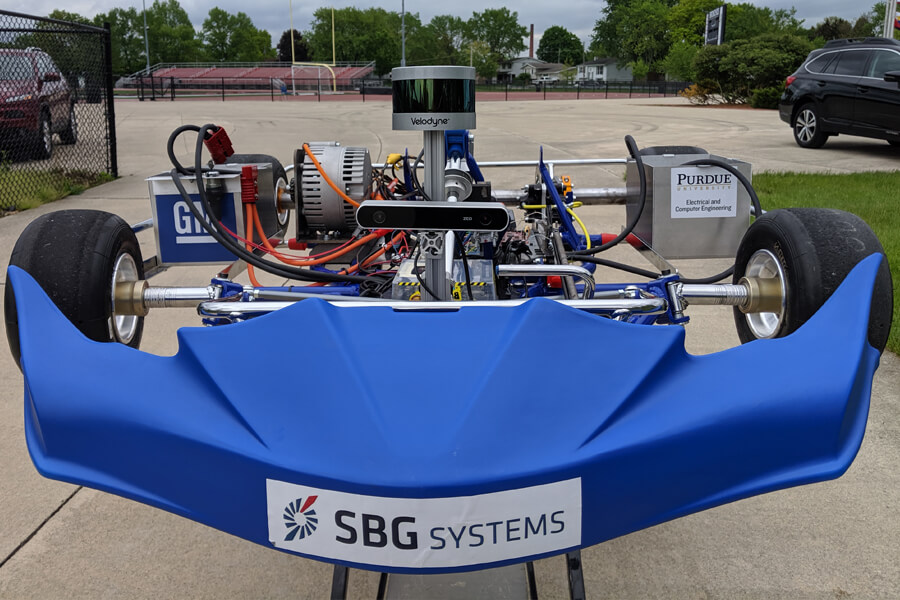Driverless Go kart Team Brings Fast Pace to Speedway
This year, there’s a new reason for Purdue students, especially those in several engineering disciplines and related fields, to bring a special passion for innovation to the infield of the Indianapolis Motor Speedway. On May 15, the evGrand Prix will host a category of competition which is at the forefront of transportation technology.
Driverless vehicles are capturing imaginations worldwide, and a number of teams from colleges and elsewhere are ready to race go-karts with autonomous features. Many Purdue students are among those who have seized opportunities to assemble the combination of expertise—mechanical, electrical and computer engineering; computer science; robotics, and more—which now propels avid research and development among carmakers.
Kai Strubel, a Boilermaker who has just graduated from undergraduate studies in computer engineering, heads a 15-member team called Autonomous Motorsports Purdue, or AMP, that will compete in the emerging category. AMP will field its own go-kart, roughly one year after Strubel began the project. He wasted no time making connections to other Purdue students, enthusiastic professors across campus and corporate resources, and progress on their unusual “race car” has gone well. Local TV news in Lafayette recently featured AMP and Purdue’s engagement with the phenomenon.
“We’ve had a lot of fun, we’re pretty passionate about autonomous vehicles, and we have some of the same technology the industry is using to solve the same problems,” Strubel says.
In one major accomplishment for the team, Velodyne Lidar, a leading company collaborating with developers on sophisticated sensor assistance for driverless vehicles, donated a premium-priced component—one of its Light Detection and Ranging (LIDAR) systems. Various other corporate donors, as well as units of Purdue, have contributed resources, too.
Participation in the evGrand Prix, not only by AMP but by another Purdue team, the Electric Vehicle Club led by mechanical engineering student Shao-Ting Huang, is a good fit with the Autonomous and Connected Systems (ACS) initiative now under way in the University’s College of Engineering. Under Dean Mung Chiang, the College is creating a multidisciplinary community of scholars to advance engineering and science in the areas of autonomy, robotics and the emerging Internet of Things (IoT).
In Strubel’s outreach to professors, he has gained strong support from Darcy Bullock, director of the Joint Transportation Research Program and Lyles Family Professor of Civil Engineering. Bullock was named last year to lead a nationwide Innovation Hub for Connected and Autonomous Transportation partnership focused on autonomous and connected vehicle research. The partnership is led through Purdue’s center for interdisciplinary research, Discovery Park.
Bullock, who is working to coordinate multiple interfaces of Purdue expertise and activities relevant to autonomous technologies, provided some funding for Strubel’s team through Discovery Park and the joint transportation research unit.

Strubel has gained insight into the necessary connections of expertise. Moving on from graduation, he says he foresees AMP’s future student leaders continuing to link today’s aspiring engineers with the high-speed gains in corporate and academic research on driverless cars.
In the short term, Strubel continues to lead the team for the May 15 race and is eager to see how AMP’s and others’ go-karts can demonstrate progress in autonomous technologies. He wants all the interdisciplinary collaborators gathering in Indianapolis to “have some successful runs.”
But he acknowledges he would love to see his Purdue team, with a kart representing smart and fast partnerships already being formed along many tracks, to shine during the Biggest Month in Racing.
“Hopefully, we can take home a win,” he says.
Writer: William Schmitt
